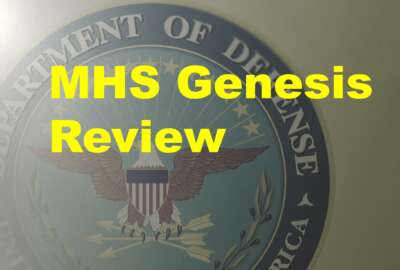
Senate wants new study of problems with DoD’s electronic health record
Senate version of Defense funding bill would require detailed examination of MHS Genesis by the Government Accountability Office.
Best listening experience is on Chrome, Firefox or Safari. Subscribe to Federal Drive’s daily audio interviews on Apple Podcasts or PodcastOne.
Just a few weeks ago, Congress ordered the Defense Department to provide a written progress report on how it’s solving problems it’s found with the implementation of its new $5.5 billion electronic health record. But senators now appear to feel that some outside oversight is in order as well.
In an amendment to the “minibus” appropriations bill the Senate passed on Thursday, the chamber voted 95-0 to require the Government Accountability Office to conduct its own study of MHS Genesis. In particular, lawmakers want to know:
- What DoD has done to improve the system since an initial report by the department’s office of Operational Test and Evaluation earlier this year found Genesis was “neither operationally effective nor operationally suitable”
- How the system is meeting health care demands at the four Pacific Northwest sites where it’s already been deployed
- Any “underlying issues” that might hamper more deployments
- GAO’s assessment of whether DoD can still meet its timeline for deploying Genesis worldwide by 2022
The amendment, sponsored by Sen. Bill Nelson (D-Fla.), is part of the Senate’s $854 billion funding bill for DoD and the departments of Health and Human Services, Labor and Education. The appropriations language still must be reconciled with the House. If it’s enacted, GAO would have to produce a report within six months.
The study would be in addition to a separate report lawmakers ordered DoD itself to compile as part of the 2019 Defense authorization bill the president signed earlier this month. That directive also demanded answers about how DoD has solved the issues uncovered in the initial OT&E findings, and prohibited the department from rolling the system out at any more hospitals and clinics until it furnishes the report.
During a conference call with reporters late last month, Defense health officials said they had chosen the next four sites that will receive MHS Genesis. They include three California bases: Travis Air Force Base, Naval Air Station Lemoore and the Army health clinic at the Monterey presidio, plus Mountain Home Air Force Base in Idaho.
But they were unwilling to predict a timeline for any further deployments until the OT&E process is complete and DoD makes its next milestone decision for the overall program.
“The next wave of deployment will be the first facilities to field the standard baseline of MHS Genesis, and will benefit from the results of our optimization period as well as improvements to our training, deployment and change management strategy, all based on lessons learned,” said Stacy Cummings, the program executive officer for Defense health management systems. “We remain agile and iterative in our approach to MHS Genesis deployment, and we’re committed to identifying the right capabilities and delivering those capabilities to our customers.”
Read more of the DoD Reporter’s Notebook.
Copyright © 2025 Federal News Network. All rights reserved. This website is not intended for users located within the European Economic Area.
Jared Serbu is deputy editor of Federal News Network and reports on the Defense Department’s contracting, legislative, workforce and IT issues.
Follow @jserbuWFED
Related Stories





